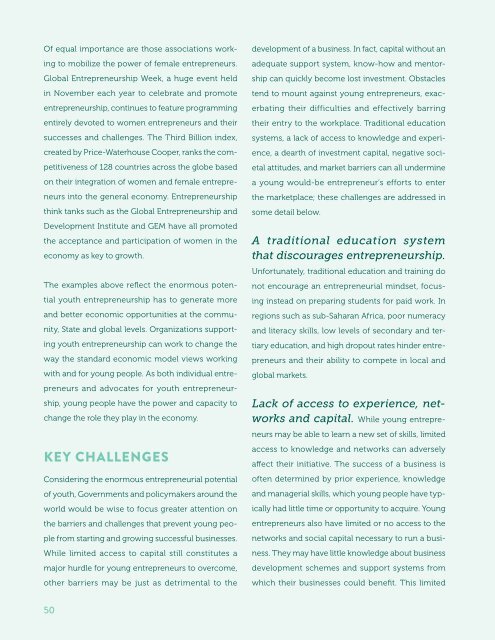YOUTH CIVIC
JieguI2U
JieguI2U
Create successful ePaper yourself
Turn your PDF publications into a flip-book with our unique Google optimized e-Paper software.
Of equal importance are those associations working<br />
to mobilize the power of female entrepreneurs.<br />
Global Entrepreneurship Week, a huge event held<br />
in November each year to celebrate and promote<br />
entrepreneurship, continues to feature programming<br />
entirely devoted to women entrepreneurs and their<br />
successes and challenges. The Third Billion index,<br />
created by Price-Waterhouse Cooper, ranks the competitiveness<br />
of 128 countries across the globe based<br />
on their integration of women and female entrepreneurs<br />
into the general economy. Entrepreneurship<br />
think tanks such as the Global Entrepreneurship and<br />
Development Institute and GEM have all promoted<br />
the acceptance and participation of women in the<br />
economy as key to growth.<br />
The examples above reflect the enormous potential<br />
youth entrepreneurship has to generate more<br />
and better economic opportunities at the community,<br />
State and global levels. Organizations supporting<br />
youth entrepreneurship can work to change the<br />
way the standard economic model views working<br />
with and for young people. As both individual entrepreneurs<br />
and advocates for youth entrepreneurship,<br />
young people have the power and capacity to<br />
change the role they play in the economy.<br />
KEY CHALLENGES<br />
Considering the enormous entrepreneurial potential<br />
of youth, Governments and policymakers around the<br />
world would be wise to focus greater attention on<br />
the barriers and challenges that prevent young people<br />
from starting and growing successful businesses.<br />
While limited access to capital still constitutes a<br />
major hurdle for young entrepreneurs to overcome,<br />
other barriers may be just as detrimental to the<br />
development of a business. In fact, capital without an<br />
adequate support system, know-how and mentorship<br />
can quickly become lost investment. Obstacles<br />
tend to mount against young entrepreneurs, exacerbating<br />
their difficulties and effectively barring<br />
their entry to the workplace. Traditional education<br />
systems, a lack of access to knowledge and experience,<br />
a dearth of investment capital, negative societal<br />
attitudes, and market barriers can all undermine<br />
a young would-be entrepreneur’s efforts to enter<br />
the marketplace; these challenges are addressed in<br />
some detail below.<br />
A traditional education system<br />
that discourages entrepreneurship.<br />
Unfortunately, traditional education and training do<br />
not encourage an entrepreneurial mindset, focusing<br />
instead on preparing students for paid work. In<br />
regions such as sub-Saharan Africa, poor numeracy<br />
and literacy skills, low levels of secondary and tertiary<br />
education, and high dropout rates hinder entrepreneurs<br />
and their ability to compete in local and<br />
global markets.<br />
Lack of access to experience, networks<br />
and capital. While young entrepreneurs<br />
may be able to learn a new set of skills, limited<br />
access to knowledge and networks can adversely<br />
affect their initiative. The success of a business is<br />
often determined by prior experience, knowledge<br />
and managerial skills, which young people have typically<br />
had little time or opportunity to acquire. Young<br />
entrepreneurs also have limited or no access to the<br />
networks and social capital necessary to run a business.<br />
They may have little knowledge about business<br />
development schemes and support systems from<br />
which their businesses could benefit. This limited<br />
50


